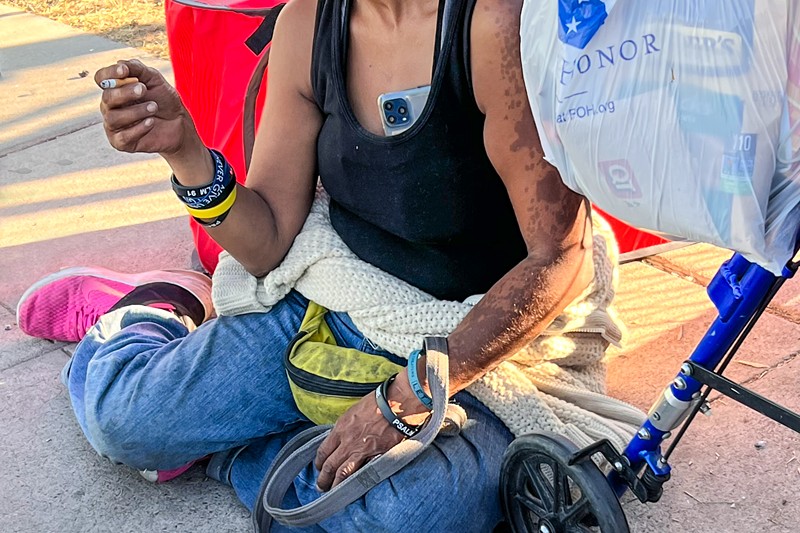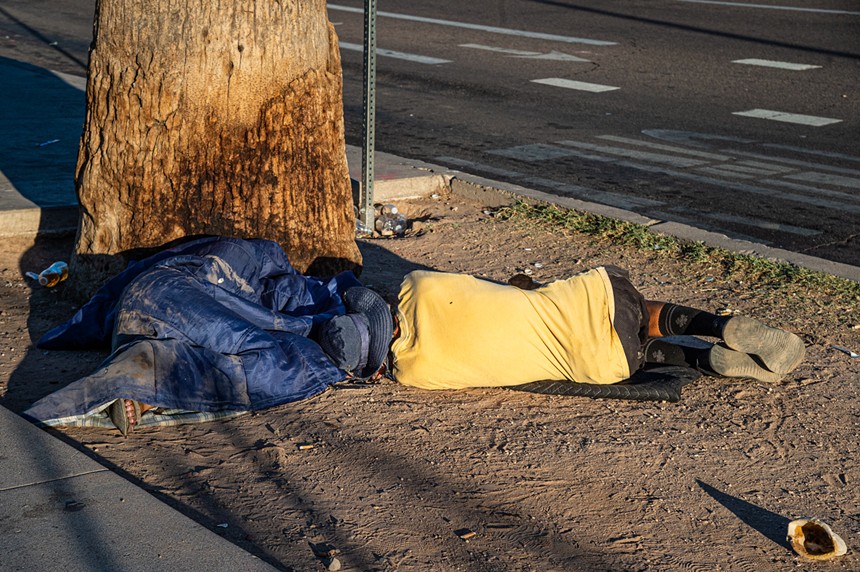Five blocks remain to be cleared. Yet as the city continues to clean up the Zone block by block, it’s becoming increasingly difficult to find a place to stay for those who decline shelter space for various reasons, including safety concerns or a desire to stay with their partner or pet.
An order to clear the Zone by Nov. 4 is still in place after Maricopa County Superior Court Judge Scott Blaney rejected the city’s appeal to push back the deadline.
As police, city crews and relief organizations worked last week on clearing the block, Zone resident Lily pushed a cart as her dog, Toro, walked beside her. Lily was looking for a new spot in the encampment. She and Toro settled down on the shaded asphalt next to another Zone resident, Luna, who, after being required to move during a previous sweep, had set up a large tent structure that covered the sidewalk. Luna had declined to move to a shelter so she wouldn't be separated from her partner, whom she met while homeless.
Volunteers with Street Medicine Phoenix, a University of Arizona public health outreach program, spent the early morning hours of the sweep handing out key necessities to unsheltered people in the Zone, including drinks, snacks, feminine hygiene products, hand sanitizer and Narcan, which is an emergency treatment for opioid overdose.
Robert Fauer, SMP's medical director, said he isn’t sure how his organization will adapt to helping the unsheltered population if the Zone is cleared out and its residents are dispersed across the Valley.
“I can come here on a weekend and bring 40 volunteers and do quite a bit of work,” Fauer said. “I don’t know how we’re going to have to modify our strategies if there’s no encampment and we have to find other ways.”

"The shelters won't take me because of my dog, Toro. People have even offered to buy him, but I tell them no," said Zone resident Lily.
O'Hara Shipe
Conflicting court cases impact the Zone
With Blaney's Nov. 4 deadline just a few weeks away, the city argued that it faces trying to obey two conflicting rulings from different courts.“The city may be forced to choose between violating one injunction or the other, with either outcome leading to sanctions," city attorneys argued in the appeal to Blaney.
The city is now looking for room to breathe in the other case, which is in federal court.
In December, U.S. District Court Judge G. Murray Snow ordered Phoenix officials not to enforce public camping and sleeping laws when there are more unsheltered people than available shelter beds. The order also requires officials to give notice when taking property and to store it for 30 days.
The city appealed that ruling on Oct. 9 and asked for the green light to enforce the camping and sleeping bans if officials move people experiencing homelessness to an “alternative public, outdoor space.” That includes the lot Phoenix purchased for $5.4 million and rezoned to construct a 300-person campground at 15th Avenue and Jackson Street.
Elizabeth Venable, co-founder of the nonprofit Fund for Empowerment, which brought the case against the city in federal court, said the shower and bathroom facilities the city has promised at the campground are a positive step. But she called the effort “quite cynical.”
“What they’re trying to do is make it so they can equate these properties, these outdoor camps, to shelters. And they’re nothing like shelters,” Venable told Phoenix New Times. “They’re not humane.”
She pointed out that until the city releases rules for the campground, there is no way of knowing what barriers to entry may exist for unsheltered people. The barriers could exclude many people from entering, including those with disabilities, mental health or substance abuse challenges.
Venable also lamented the fact that for decades Phoenix has spent little of its own money on shelter and housing, making limited investments using only federal funds specifically for those purposes.
The Fund for Empowerment is still trying to get the city to track more details about the shelter officials are offering each person during the sweeps, including how long each person stays in the shelter and whether they leave voluntarily or involuntarily. Organizers submitted a citizen petition to Phoenix City Council on Sept. 20, and Venable said the city is considering whether it's valid.
Concern over the reality of shelter offered is not the only issue troubling activists. Venable said she’s spoken to many unsheltered people who have had their property, including ashes of deceased family members or key documents needed for receiving assistance, destroyed by city officials. She said city workers in the Zone may not be aware of the federal court’s order not to destroy private property.
Fauer said his organization may service the city's new campground — if it actually opens. “I think it’s going to happen, but it’s going to happen after all of these people are displaced,” he said.
City spokesperson Kristin Couturier told New Times the city has no further comment as the legal process plays out.

The Zone cleanup has caused a free-for-all among residents who pilfer through the discarded items of others.
O'Hara Shipe
‘Those rulings are very disturbing’
As the city moves to clear the Zone and meet Blaney's deadline, it is concerned about the lack of available shelter space.“If the city were to move at a quicker pace, the small amount of available shelter space that exists would likely immediately disappear, without space to accommodate individuals who are displaced," the city argued in its appeal of Snow's decision.
Snow's judgement was, in part, based on a 2018 ruling in Martin v. Boise in which the 9th U.S. Circuit Court of Appeals said cities can't enforce camping laws if there are not enough shelter beds available.
Blaney, the Goldwater Institute, Phoenix and other cities, and several Arizona groups have urged the U.S. Supreme Court to review Martin v. Boise. The Goldwater Institute has argued that a person is not “involuntarily unsheltered” if he or she declines an offer of shelter from the city.
Venable said she takes issue with the efforts to get the conservative high court to consider the issue, as well as with Blaney’s push to clear out the Zone.
“Those rulings are very disturbing to me as someone who tries to create conditions where people on the streets are viewed as genuinely human,” she said.











